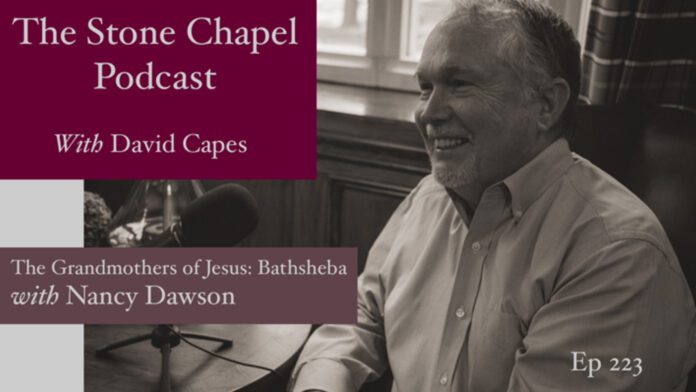► Listen on Amazon
► Listen on Apple
► Listen on Spotify
► Listen on YouTube
You can find previous episodes of “The Stone Chapel Podcast” at Lanier Theological Library.
“The Stone Chapel Podcast” is part of the ChurchLeaders Podcast Network.
This transcript has been edited for clarity and space.
Nancy Dawson
Hello. I’m Nancy Dawson. I’m an independent researcher and scholar who lives in the area and really enjoys the Lanier Theological Library.
David Capes
Dr. Nancy Dawson, good to see you back. Welcome to The Stone Chapel Podcast.
Nancy Dawson
Thank you so much. I’m really glad to be here. It’s such a resource, such a sanctuary for wonderful things like biblical research and lectures.
David Capes
You’re an independent scholar, and you’ve written a terrific book called “All the Genealogies of the Bible,” and that’s the context of our conversation today. Matthew, chapter 1 is the big genealogy of Jesus. I’ve called it the “grandmothers of Jesus”, and we’re going to be talking today about the wife of Uriah. We’ve talked already about Tamar. We’ve talked about Rahab. We’ve also talked about Ruth, but now we’re up to mother number four. She’s not even really given a name. Is she? Tell us a little bit about what’s going on in the passage.
Nancy Dawson
It’s wonderful that Matthew goes back to the Hebrew Bible, and he draws upon those narratives. Her story is found in 2 Samuel 11 primarily, and then also in 1 Kings. She’s known as the Queen Mother of Solomon. Her story is totally remarkable. She’s the first of the women that is a Judahite. So she comes from the tribe of Judah. She’s living in Jerusalem. She’s basically a soldier’s wife, and both her father, Eliam and her husband Uriah, are soldiers in David’s army. They are among the select, the 30 mighty men of David. So, there’s this is an elite force within David’s army.
David Capes
Yes, their version of the Green Berets. Now, Uriah is described as a Hittite, not as a Judahite.
Nancy Dawson
Yes, this is clearly a mixed marriage. He’s of the ancestry of the sons of Heth, which would be among the original occupants of Canaan. But many people are brought into David’s army that are from the surrounding areas, and so he has this wide support. Uriah is known as Uriah the Hittite. He is married to this woman, Bathsheba, or Batsheva. Her name means daughter of the oath, and you don’t really realize the significance of that until much later in the story.
They live somewhere in the city of David. David’s Palace is up on the north end towards the temple mount, the Mount Moriah area. David sees her one evening, after it’s gotten dusky. He sees her when she is in her own personal courtyard of her home. He’s walking on the walkway, the ramparts of his palace, and sees her bathing. The first time the word is used it’s just normal bathing. But the second reference to her bathing is that she is purifying herself from her menstrual cycle, and this is called the state of nada.
During that seven day period when there’s blood, the person is considered segregated from society, if you will. So, she is very Torah observant. This shows that after the seven days of her menstrual period, she is bathing, and this makes her pure. She can then worship and go back into society. You see that David is from this position of a higher vantage point, looking into a private courtyard. She is not out publicly bathing and bathing back then is not as we think of it. It’s not in a bathtub. It’s more like what you would call a Spitz bath.
David Capes
I grew up calling it a sponge bath.
Nancy Dawson
A sponge bath, right.
David Capes
So, David is at a lofty advantage point. We’re told earlier that David is staying home when his soldiers are actually out in the field. They’re actually out making war at this point against their enemies. That’s a little bit of an indictment against David, it seems. The passage in Matthew says that David fathered Solomon through the wife of Uriah, her name is not even given.
Nancy Dawson
It should be understood to be a specific indictment against David. Because as the story unfolds, it shows that Uriah is the righteous soldier. He is honorable. David in doing this, is dishonorable. He, the Shepherd King, is not acting in a way that is righteous. Bathsheba has not only her husband, but she has a grandfather named Ahitophel, and he was highly esteemed in David’s court. It was said that his advice was like one who had inquired of the Lord God. So, he was like a seer. The story back in Samuel says that he supported Absalom’s rise to power rather than Solomon. Eventually he commits suicide, and so here she has a grandfather that’s died, and her husband is eventually murdered by David.
David Capes
Uriah dies from David’s direct action. He puts him forward in the battle and urges his other soldiers to withdraw.

